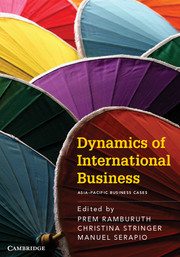Preface
Published online by Cambridge University Press: 05 August 2013
Summary
It is widely acknowledged that actively engaging students is vital to the learning process. Unfortunately, our education systems have all too often fostered one-way communication and information flows from teacher to student. As a result, it is sometimes difficult to get students to participate actively in class discussions, and this is probably more true in the Asia-Pacific region than in the United States and Europe. However, most of us are familiar with the Chinese proverb: ‘Tell me and I’ll forget; show me and I may remember; involve me and I’ll understand.’ This book is designed to help teachers of international business implement this sage advice in their classrooms through the use of cases.
While there are a number of experiential learning techniques that can be used in higher education, case-based teaching is one of the most efficient and flexible methods for actively involving and encouraging students to make the transition from classroom to practice. Cases provide an opportunity for students to apply technical knowledge and theories derived from lectures and textbooks to real-world situations. Effective integration of cases as part of a course can allow students to cultivate an array of skills that will be useful in their careers. Specifically, Edge and Coleman (1986) list nine action skills that are reinforced through the use of cases – skills that enable a person to:
think clearly in complex ambiguous situations
devise reasonable, consistent, creative action plans
apply quantitative tools
recognise the significance of information
determine vital missing information
communicate orally in groups
write clear, forceful, convincing reports
guide students’ careers
apply personal values to organisational decisions.
- Type
- Chapter
- Information
- Dynamics of International Business: Asia-Pacific Business Cases , pp. xv - xviiiPublisher: Cambridge University PressPrint publication year: 2013

